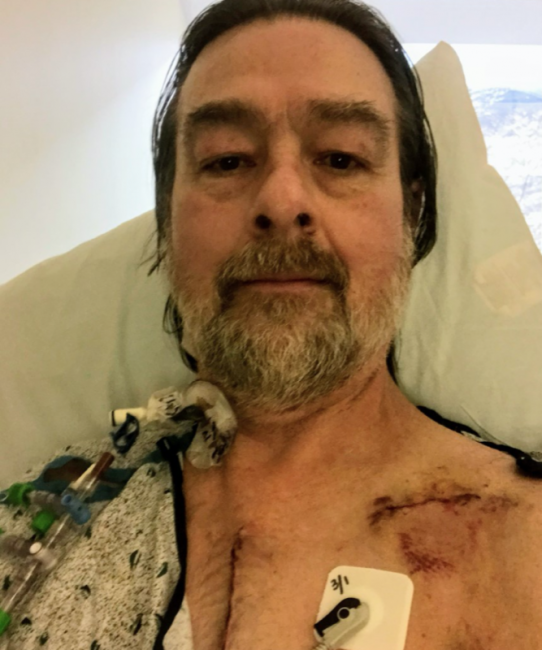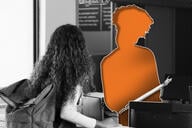You have /5 articles left.
Sign up for a free account or log in.

Stephen Oross recovers from his heart transplant earlier this year.
Stephen Oross
Kutztown University denied a recent heart transplant patient his remote teaching accommodation request, arguing that the “fundamental alteration of the delivery of a course” is not a “reasonable accommodation” under the Americans With Disabilities Act.
The university says it received three other professors’ ADA accommodation requests to teach online this semester. It granted none.
Stephen Oross, the associate professor of psychology with the new heart, says Kutztown adopted an effective “blanket denial” policy regarding accommodation requests, in possible violation of the law. He’s considering legal redress against the Pennsylvania university.
In the meantime, he’s refinancing his home and tapping into retirement funds to afford his medical and other bills. He’s also hoping that his benefits won’t be affected due to his being forced to take leave this semester.
“I do not have any confidence whatsoever in the administration at this point,” Oross said. “I don’t trust them.”
Oross, who has taught at Kutztown since 2002, suffered what’s commonly referred to as a “widow-maker” heart attack in 2014. He had double bypass surgery and survived but experienced a life-threatening reaction to the blood thinner he was given for a subsequent blood clot in his leg.
He eventually returned to work, and his heart sputtered along until 2020, when he started losing consciousness due to decreased heart function. It became obvious that Oross would either get a new heart or die. He got his new heart in February and participated in serious cardiac rehabilitation after that.
By this summer, Oross was doing well enough to be cleared to return to work. But his doctors said teaching in person was out of the question, as the immune system-suppressing medication he’s on to prevent his body from rejecting the new organ puts him at a high risk of contracting severe COVID-19. The immunosuppressants also make the vaccine’s effectiveness uncertain, even with a third shot.
“Because of Dr. Oross’s current immunosuppressed state, and the increasing rates of COVID-19 infections, I have serious concerns about him returning to teaching in person and being in close contact with students and others at this time,” Shelly Hankins, one of Oross’s doctors at PennState Health’s Milton S. Hershey Medical Center, wrote in a letter addressed to Kutztown’s disability services office. “I have discussed at length COVID-19 precautions and infection prevention with him. And at the last appointment in July I recommended that he remained in a low-risk teaching environment and work remotely to limit his risk of contracting an infection.”
Oross approached Kutztown’s human resources office about an accommodation casually at first, he said, since he thought it was “good news” he’d be allowed to return to teaching at all.
Office personnel told him to submit a formal ADA request -- and that it would be denied.
“I understand your concerns about returning to the classroom in-person this fall. Unfortunately, there is no provision for you to convert your in-person courses to an online modality for the fall semester,” Jennifer S. Weidman, director of human resources, wrote to Oross in August. “As you know, flexible work arrangements only pertained to the last academic year. You could apply for an ADA accommodation, but under the ADA, an accommodation is not considered reasonable if it is a fundamental alteration so significant that it changes the essential nature of the goods, services, facilities, privileges, advantages or accommodations offered.”
Oross understood that Kutztown sought to return to what it called “pre-pandemic” modes of operation this fall, and he’d been planning to use Zoom to teach his four upper-division courses while his students attended in person. He imagined he’d able to offer them a relatively “pre-pandemic” experience, supervising small-group activity from a screen at the front of the room, for instance.
Kutztown’s posture shocked him. Oross applied for the formal ADA accommodation, despite the apparently poor prospects. It was denied, without any discussion of how Oross might normalize the classroom experience for his students. His request to hold office hours remotely also was denied.
“The university has a duty to students who have signed up for and expect face-to-face classes to be delivered in that modality unless and until directed by commonwealth [of Pennsylvania] authorities to discontinue face-to-face instruction,” the formal denial letter states.
A few days before fall classes started, Oross said Kutztown offered him two unspecified “high-demand” courses, to be taught online. But when Oross asked questions about what those courses were and how many students he’d be teaching, he didn’t get any answers.
Oross is now on medical leave, unpaid, having exhausted the 15 sick days and two personal days for which he was still eligible this year.
It’s not just faculty members who say Kutztown has let them down. Students with medical conditions also say that they’ve had their COVID-19-related requests to study online this term denied. They’ve posted some of their accounts, anonymously, on Instagram. In one case, a student who expressed concern that none of her upper-division courses offered virtual options was told to consider taking a leave of absence or transferring to an online university, perhaps or perhaps not transferring back to Kutztown after the pandemic.
Matt Santos, university spokesperson, said that he couldn’t answer any questions about Oross’s case, including which courses he’d been offered at the last minute, due to employee and medical privacy laws.
“Though we attempt to meet the needs of each member of our campus community, our ability to do so is frequently impacted by policies not set by the university,” he said. “However, we do make every effort to accommodate these requests within the parameters of the laws and regulations.”
With this in mind, Santos continued, “we have made a commitment to our students to offer a face-to-face experience this year. We had four requests to teach remotely this fall via application for ADA accommodations. While some of these requests may have been related to COVID-19, the requests ultimately had to be within the standards of ADA laws to be accommodated through that process. The criteria to judge the requests was based on medical conditions as defined by the ADA.”
Kutztown’s decisions were based on medical documentation, the impact of the disability and “whether or not the requested accommodation met the ADA definition of ‘reasonable,’” Santos also said via email.
Santos defined reasonable accommodations as “any change to the application or hiring process, to the job, to the way the job is done, or the work environment that allows a person with a disability who is qualified for the job to perform the essential functions of that job and enjoy equal employment opportunities.” Accommodations are further considered reasonable if they don’t create an “undue hardship, do not cause a direct threat to health or safety of others or would not constitute a fundamental alteration.”
Fundamental alteration of the delivery of a course, he said, is not a reasonable accommodation under the ADA.
Regarding the three other faculty members who submitted requests and were denied, beyond Oross, Santos said they were granted leave under the Family and Medical Leave Act, which entitles employees to take unpaid leave with a continuation of group health insurance coverage. Not all those employees were granted 100 percent leave, however, he said. Employees can also take accrued sick leave, up to 90 days in a calendar year.
Santos said that all enhanced COVID-19-related benefits were discontinued by the state of Pennsylvania this summer, “and we continue to follow the laws in granting accommodations.”
Oross said that he “can't imagine” that changing a course’s format, keeping all other aspects of the course the same, constitutes an undue burden or hardship for the university.
“I’m not a lawyer, but I think they will have a hard time proving that that actually meets the definition of a fundamental alteration,” he said, accusing the university of “gaslighting” those seeking accommodations, and the campus community more broadly. He also accused Kutztown of doing the “bare minimum” with respect to COVID-19 prevention and mitigation, requiring masks but not vaccines or comprehensive testing, and doing little to facilitate classroom social distancing.
There is at least some legal gray area as to what constitutes a reasonable accommodation under federal disability law, as some institutions have granted professors’ remote teaching requests this semester.
Cornell University, for instance, said in August that it would not consider any remote teaching requests this fall, even those “premised on the need for a disability accommodation.” After the university was criticized on both moral and legal grounds, Cornell softened its stance, saying that it was “steadfastly committed to offering a wide range of individualized accommodations as we resume in-person operations this fall.”
Individual academic and administrative units at Cornell may, “at deans’ and unit leaders’ discretion, choose to offer additional options for faculty and staff with extraordinary circumstances that prevent them from teaching and working in person this fall,” Cornell also said after the backlash against its own attempted blanket ban on remote teaching. “Those options may include a reduction in work hours, a temporary reallocation of teaching duties, and/or short-term or partial remote instruction.”





